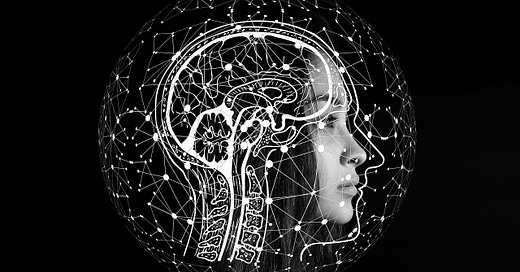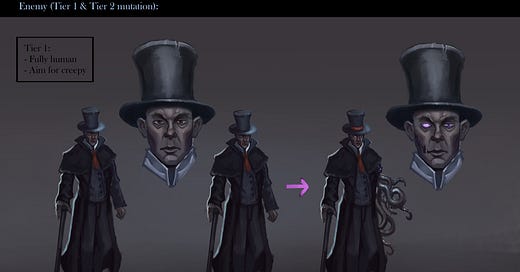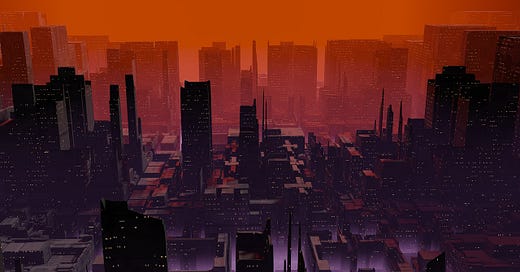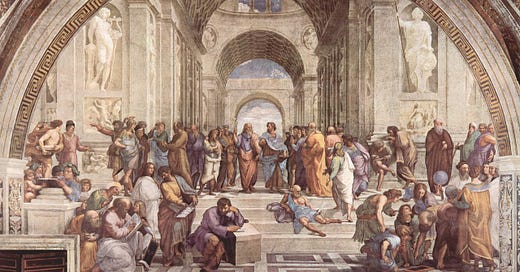
Sacrificing Creativity on the Altar of Progress
A critique of the discourse around new types of artificial intelligence
With each new technology that emerges on the world stage, there is an ethical risk. Whilst Artificial Intelligence has been a hot spot for debate for many decades, it has mostly been accepted as moral, so long as it doesn’t cross certain boundaries. However, with the recent emergence of writing and image generators, I believe that we are at a dangerous crossroads.
Before espousing any apocalyptical predictions, I will highlight the areas in which AI has been healthy in my view and try to determine the distinction; why X variation of AI is a likely harmless advancement, yet Y appears to be immoral. The AI which dictates the actions of NPCs in videogames is a technology which does not replace a human skill. It would be unfeasible for every character in a single player story game to be controlled by another player. The AI that powers basic grammar checking allows people to reduce time editing, and bolsters the message that they are trying to communicate. It may have lessened the demand for editors, but for many, proof reading is not something they delegate regardless. In this scenario, AI only reduces the time spent on minutia.
From these examples, some primary ways in which AI appears to be cohesive with current societies is when it satisfies one or both of the following: it enables a new level of an existing operation, wholly unachievable by humans, or it automates tedious yet necessary tasks. It is important for our collective future, to conceive of a weighing scale with the negative and positive effects of an AI on each side. The ethical implications may be difficult to predict or uncomfortable to discuss, but that does not exempt them from consideration. Indeed, where an outcome is uncertain, the need for thorough discussion is only more necessary.
The death of the human element
The new wave of AI is concerning in its attempt to emulate the development of products, rather than editing existing content. Steven Zapata predicts a future wherein the image generation models will not require prompts and will instead produce automatically based on trending topics. An entire social media feed could conceivably be generated by AI, with no human required. This abstraction of human input from processes is where I believe the most pressing danger lies. I argue that it is innately immoral to reduce the number of jobs in a world where unemployment is of significant concern, but this is not to say that there are no counterpoints. With any complex scenario, an immoral act may beget a moral one. If a machine exists that performs life-saving surgery with a 200% improved success rate, yet takes jobs from a swathe of doctors, there arises a difficult moral quandary. The doctors may be plunged into economic ruin, and the population will become dismayed as they realise that even very specialised jobs are not safe from automation. It is not obvious which side would be morally validated. It may even be subject to the specific statistics.
However, here we are not talking about saving lives, certainly not in any way beyond vague speculation. There is a curious argument being propagated online, drawing attention to the cotton mill, which revolutionized the production of clothing, but destroyed lifelong careers of weavers. Often this is accepted as an overwhelming positive in the great march of progress, and evidence of the need to charge forward. I will attempt to dissect the reason why art in particular cannot be so easily swept under the rug with this analogy. Quantity of clothing is something that is innately valuable. As populations grow, the demand for clothes is increased. In colder zones, this is inextricably linked to survival. Clothing also lacks the longevity of art in most cases, so it necessarily depletes and restocks. The utility of clothing is in its immediate effect. Conversely, the body of existing art stretches back centuries through various means of preservation and remediation. The quantity of art that any one person can obtain with just access to a phone and internet would already be enough to satisfy a lifetime. Therefore the only benefit remaining to advocates of AI art is the ability to personalise art on an individual basis at little cost, and this must stand against all of the negatives.
Addressing Midjourney and other image generators, I believe the majority of the public discourse has been too narrowly focused. There has been a tendency to argue that the theft of art is the primary evil of these systems, and I do not disagree that it is a deplorable overreach. However, I have little doubt that technology will eventually overcome the problem of scale and the image generation systems will be able to thrive without theft, whether compelled to do so by policy or public perception. In my estimation, the more insidious and long term issues lurk below this veil. As an artist, I have been very attuned to the difficulties of earning money in the art industry, not least because of the level of competition. With AI art being endlessly vomited into popular social platforms, it is becoming ever more difficult for artists to surface for air, forced to reach for whatever they can to stay afloat.
One such method is to argue for an inherent value in the process. Many have argued that the ways that a human creates is different to that of an AI. They, as the argument goes, have the filter of soul, experience and imperfection, whilst a machine only produces a series of precise copies and places them together, like pieces of an extremely complicated puzzle. This does little to harm the overall impact of the issue however… The human paints with brushstrokes (digital or otherwise) whilst the machine paints with stencils of existing information.
The rise of photography might act as comfort to some, in that it did not replace realistic art; people still value the human element. However, the kinds of art satisfied by digital media are often part of a greater production, such as a game or film. When the only thing that the audience sees are 3D models, one or two steps removed from a piece of concept art, the value that companies care about is not in the labour of love, but the production of a blueprint. Game studios have already revealed their readiness to abandon artists as soon as a cheaper alternative arises, such as Mindark, a Swedish company who announced that they would lay off 40% of their workforce, whilst pivoting into AI world generation.
So far, I have seen no reason to believe that AI will not succeed widely in imitating the human experience or the soul, in a kind of art based Turing test. There are already many fooled by certain AI art pieces, believing them genuinely to be the conception of a human. There was even a controversy wherein an AI generated piece won a digital art competition. If there is some true distinction between human and AI art on the canvas, yet people cannot identify it, what relevance does that have commercially? The only thing left to give an innately human value to a piece of art will be to prove that a human produced it, a problem that sadly is not pure speculation. Artists have already been forced to make time-lapse to prove that a human has been the producer of a piece of art.
AI and the ability to think
If we become over reliant on AI text generators, there is the possibility that we could lose the ability to exercise thought effectively: overusing a calculator will worsen the ability to perform mental mathematics. Using a Sat Nav and adjacent phone applications may cause a decrease in the ability to remember directions. In line with this, I believe that AI writing will damage creativity and lateral thinking, by virtue of reducing the necessity to engage in these skills. I concede that directions and mental mathematics, though I would be loath to lose them, are arguably not required in a constructive society. With technology ever available, these skills are easily replaced from day to day. Their efficacy is also assured and easily verifiable in most cases. Arriving at the correct destination confirms outright the result of the sat nav. However, the loss of thought seems only to invite stagnation and dull resistance to those in power.
We that we can never be sure that a machine is operating in our best interest. OpenAI is moderated with criteria which prevents “hate” and “Sexual [content]” from being displayed in its answers. The latter is relatively unambiguous; sexual content relates to a specific topic which only becomes hazy when considering where it crosses into educational/scientific content. Hate is instead broadly related to a wide breadth of topics, is not universally defined on a scale, and is often identified using incomplete information about a person’s intentions. At best, the developers are trying to create a healthy framework, yet compromise the objectivity of the system, and at worst, they open the gates for the systems to be weaponised against critical thought when terms are used too loosely. The only sure way to verify that generated ideas arrive from good-will is to have created them ourselves. All other ideas arrive from a locus of trust that we project outwards. The more time we spend with family and friends, the more evidence we collect to understand whether they too are acting in good will towards us. It is far more difficult to ascertain the motives ingrained in an AI, for it is too far removed.
The race to Utopia
In an interview conducted between Stan Prokopenko and Evan Conrad, there is a disturbing passage, wherein Conrad explains that there exists an imminent Utopia which will be heralded by AI processes. In short, he believes that within ten to fifteen years, most labour costs can be reduced to zero, or else a negligible cost. At this point we will have a society where everything is practically free and people can have time available to pursue their passions without limit. He concedes that the decade to a decade and a half of transition will damage current livelihoods, but that this will be the price of Utopia. The usual recourse of the techno-utopian worldview is that this void where jobs and survival used to belong would give rise to a society who focus their attention on the arts and expression. Not only do I believe that this would not serve the temperament of a vast swathe of the populous, but the very intrusion of AI into artistic spaces is likely to doom any potential Utopia of this kind.
It also appears that those leading the AI push are ignoring a major issue with creating a jobless Utopia; people need challenge. The pursuit of only hedonistic pleasure is rarely conducive to a positive mindset:
Friedrich Nietzsche said that “one must still have chaos in oneself to be able to give birth to a dancing star.”
A person born into a world where there is perfect order and serenity, if indeed this could be managed for more than five minutes, would likely create the chaos that they need to express themselves. This makes sense. Licensed doctor, Alok Kanojia says that the wellbeing and self esteem of a person is birthed out of confidence, yet confidence must arise out of hardship, or else one has no evidence that they will remain unshaken by conflict.
Conclusion
I believe that the answer to worrying advances in technology is not to bury our heads and put up flimsy defences to avoid action. AI seems to be on a trajectory toward the development of a less humanist society and will likely only be accelerated if we continue to sacrifice parts of our selves without weighing the cost. In my view, we simply cannot continue on a path that diminishes the value of art and thought, if we wish to improve the world.
My thoughts on AI were largely set in motion by this video by Steven Zapata, which is eloquently written and extremely compelling. I do not share his conclusion, that we should seek an ethically sourced model, since I have not been convinced that any such model should exist, period. Regardless, I consider it essential reading (or listening) for anyone entering into the realm of image generation discourse.














Some insightful reflections here. To throw in my two cents, I really just see AI as a tool like a hammer - I can use it to build incredible things... or I can use it to bludgeon people to death in an incredibly anti-human capacity. The difference here is in the intent of the user. If the intent of a piece of AI is truly to decrease the ability of humans to flourish or control our societies according to one vision of what is "good", then I can't say I'm particularly keen. But, a visual to accompany one of my poems when I'm not in a position to reciprocate an artist for the time they put in to one of their pieces, so that my piece may make its way to the light of day when it wouldn't do so otherwise? Sure. I even find myself using AI tools to generate suggestions for phrases or sentences for my written works if I'm finding myself in a writer's block. Here, I'm not giving all my agency over to the AI - I'm creating a space where the AI can do what it does best, but in a way that is fundamentally in service of my human flourishing and capabilities.